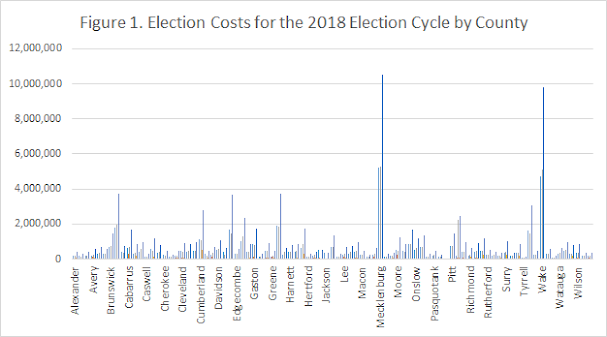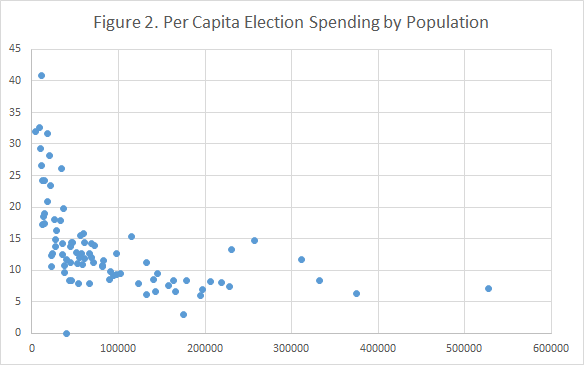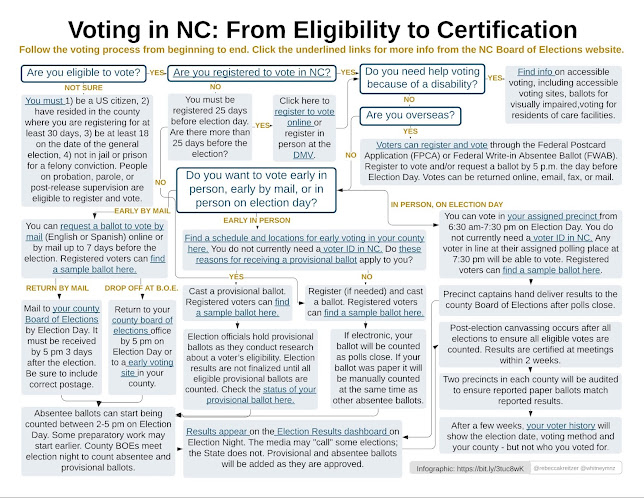Making North Carolina elections more transparent and accessible
Published September 16, 2021
This post draws attention to two important issues with voting in North Carolina: first, that voting across the state is inconsistent, and second, that voters are concerned about the security of the process. Making voting more consistent and increasing transparency and education about the voting process will improve both voter equity and confidence in our electoral system.
HOW IS VOTING ACROSS NORTH CAROLINA INCONSISTENT?
North Carolina counties spend vastly different amounts on administering elections. Figure 1 shows the total amount spent by each county in North Carolina in the 2018 election cycle (from 7/1/2017 to 6/30/2019). More heavily populated counties like Mecklenburg and Wake spent around $10 million each, while counties with fewer people, like Tyrrell and Washington, spent closer to $200,000. Person County, which is north of Durham and has a population of over 39,000 people, reported spending $0 conducting elections during this cycle.

The median amount spent by each county was $11.84 per capita. Several counties spent two or even three times this amount, and one county spent 10 times this amount. This spending is somewhat related to population, but the relationship isn’t as close as one might think. As Figure 2 shows, as the population of a county grows, in general, the per capita spending on elections decreases.** However, this decrease occurs sharply, and once a county reaches around 45,000 in population, they may spend anywhere between $5 and $15 per capita.

This differential spending manifests itself in many ways, from how many early voting and election day polling sites are opened, to whether the county offers mail in voting, to what kind of “I voted!” swag a voter receives. Some counties have apps that let voters know how long the lines are, while other counties struggle to find enough staff that know how to operate a computer. These inconsistencies matter because we know from Kropf and Pope (2020) that election expenditures are closely related to voter turnout.
When fewer polling places are open and working, lines get longer, which inevitably causes some voters to turn away. Even those voters who are willing to wait in line might have a hard time finding their polling place, because poorer and more rural counties struggle to find suitable, centrally located community buildings that can host elections. Voters in these counties will inevitably have less access to the ballot than voters in wealthier counties, and this disenfranchises younger, independent North Carolinians in some counties, and poorer, Latinx North Carolinians in others.
ARE ELECTION SECURITY CONCERNS A PROBLEM? In fall 2020, the Meredith Poll found that nearly 17% of North Carolinians were not confident that our voting processes would produce accurate results. These feelings were most pronounced among non-White North Carolinians and older North Carolinians, groups who traditionally have trouble accessing the ballot equally.
Voters who don’t fully trust the process are much less likely to turn out to vote, which is a problem if we want elected officials to be truly representative of the wishes of their entire constituencies. However, low political efficacy- defined as someone feeling as though they can’t have an impact on the political process, or that the political process won’t listen to them if they tried- is also a dangerous problem for democracy itself. This is because high political efficacy is linked with the stability of democracy.
Therefore, if work toward improving the political efficacy of North Carolinians isn’t a top priority- by assuring them that their vote is important, their vote counts, and that the entire voting process is secure- then the risks are substantial to the health of North Carolina’s government and society.
POLICY RECOMMENDATIONS
If it is harder for some Americans to vote than others, this means that some votes count more than others. The US Supreme Court held in Wesberry v. Sanders (1964) that every vote cast in an election must be counted equally, or Article I’s demand that our representatives be chosen “by the people” is unsatisfied. Similarly, if large numbers of Americans are not voting because they are not confident in the process, their views will go unrepresented and we cannot claim that our government is “of the people,” either.
1. How can we increase consistency in voting across North Carolina?
One way to increase consistency across North Carolina is to balance the election administration budgets of our 100 counties by shifting funding of this important civic event to the state level. The state could ensure that each county gets an amount of funding appropriate for their population, which then ensures that each North Carolinian has access to roughly the same election experience. Overall election spending might even decrease if this happened, because as Figure 2 above demonstrates, provision of election services becomes cheaper as more voters are involved due to economies of scale.
Another way to make things more consistent across the state would be to expand mail voting. There has been a lot of misinformation about the safety and implications of vote-by-mail. However, there is consensus among experts that there are few cases of documented fraud with vote-by-mail. Additionally, it improves turnout for all demographic groups, and doesn’t benefit one political party.
Furthermore, a majority of Republicans and Democrats want vote-by-mail. In fact, a Reuters/Ipsos poll from before the 2020 election reported that 72% of Americans, including 79% of Democrats and 65% of Republicans, wanted the government to require mail-in-ballots for the November 2020 election. This view was at least partially influenced by the ongoing Covid-19 pandemic, but voters like vote-by-mail even in elections held outside of a pandemic because it is convenient and it ameliorates serious ballot access concerns, such as lack of transportation or the location or hours of polling sites. It also allows voters to be more thoughtful, as they can take their time going through the full ballot at home instead of feeling rushed in the voting booth.
2. How can we increase voter confidence in election security in North Carolina?
We need to assure North Carolina voters that the ballot process is secure and that their vote will count. This requires voter education on how to vote and what happens to their vote after they submit it. How does someone register to vote? How can someone submit their vote? Where does it go after that? Who counts the ballots, and when? The North Carolina Board of Elections has good answers to all of these questions on their website, but they’re scattered in different locations and not as easy to follow as they could be.
In order to assist voter education efforts, we have created an infographic with hyperlinks that takes voters through the entire process, from who is eligible to vote all the way to certification of the final count. It is intended to make voting as clear as possible and ensure that everyone feels confident in the accuracy and legitimacy of the process. When voters are confident in the process, they will be more likely to accept the results of the election and remain satisfied and engaged with our government.

CONCLUSION
We can take steps now to improve our elections in the future, before the effects of the pandemic ravage county budgets and make voting even harder for North Carolinians in the 2022 and 2024 election cycles. If North Carolina values the core democratic tenet of “government of the people, by the people, for the people,” we should make voting consistent, accessible, and transparent.
Democracy only truly works when everyone has an equal ability to use their voice.--------------------
*Rebecca J. Kreitzer is an associate professor of public policy at UNC-Chapel Hill and tweets at @rebeccakreitzer. Whitney Ross Manzo is an associate professor of political science and assistant director of the Meredith Poll at Meredith College in Raleigh, NC. She tweets at @whitneymnz.







